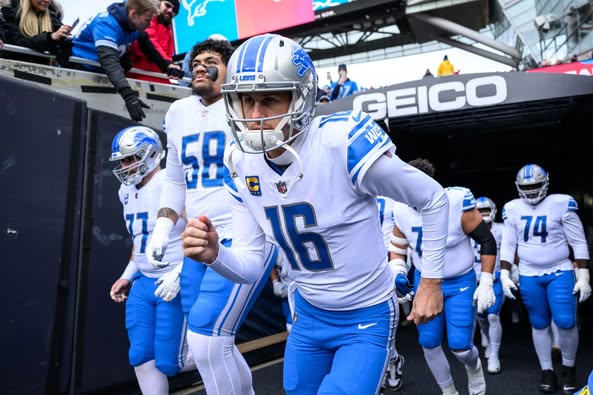The NFL schedule release for the 2025 season has brought a mix of excitement and disappointment for Detroit Lions fans. For the first time in recent memory, the Lions will not be featured in the NFL season opener, a marquee slot typically reserved for the league’s most high-profile teams or compelling storylines. This decision by the NFL has sparked conversations about the Lions’ standing in the league, their recent performance, and what it means for the franchise moving forward.
The NFL season opener is one of the most coveted spots on the league’s calendar. Traditionally, the defending Super Bowl champion hosts the first game of the year, but in recent seasons, the league has expanded the opening night to include additional high-stakes matchups. Teams like the Kansas City Chiefs, Dallas Cowboys, and Green Bay Packers have frequently been featured in these slots due to their large fanbases, star power, or recent success. The Lions, despite a strong 2023 season and a deep playoff run, have been passed over for the 2025 opener, signaling that the league may still view them as a secondary draw compared to more established franchises.
Detroit’s absence from the season opener is particularly surprising given their recent resurgence. Under head coach Dan Campbell, the Lions have transformed from perennial underachievers into legitimate contenders. The 2023 season saw them win their division for the first time in decades and advance to the NFC Championship Game, where they narrowly lost to the San Francisco 49ers. With a young, talented roster featuring stars like Jared Goff, Amon-Ra St. Brown, and Aidan Hutchinson, the Lions seemed poised to become a mainstay in prime-time matchups. Yet, when the NFL unveiled its 2025 schedule, Detroit was nowhere to be found in the opening night lineup.
So, why were the Lions excluded? Several factors likely played into the league’s decision. First, while the Lions have been impressive, they lack the national appeal of teams like the Cowboys or Chiefs. These franchises have decades of history, massive fanbases, and superstar players who draw eyeballs regardless of their record. The Lions, despite their recent success, are still rebuilding their national reputation. The NFL is a business, and the season opener is designed to maximize viewership. If the league believes another matchup will generate higher ratings, they will prioritize it—even at the expense of a deserving team like Detroit.
Another consideration is the opponent. The NFL often schedules the season opener based on compelling narratives or rivalries. If the defending champion is a team like the Chiefs or Buffalo Bills, the league may prefer to showcase them against a historic rival rather than the Lions. Additionally, the NFL may be saving Detroit for other high-profile slots later in the season, such as Thanksgiving (where the Lions are a traditional host) or a marquee Sunday or Monday night game. The absence from the opener doesn’t necessarily mean the Lions won’t have a strong presence in the 2025 schedule—it just means the league had other priorities for Week 1.
The reaction from Lions fans has been mixed. Some are frustrated, seeing the snub as a lack of respect for a team that has earned its place among the league’s best. Others are more understanding, recognizing that the NFL’s scheduling decisions are driven by business considerations as much as on-field performance. There’s also a sense that the Lions, if they continue their upward trajectory, will eventually force their way into these premier slots. Sustained success is the surest way to gain the league’s attention, and if Detroit can make another deep playoff run in 2024, they’ll be hard to ignore in future schedule releases.
From a broader perspective, the Lions’ exclusion raises questions about how the NFL selects teams for its biggest games. While the league often emphasizes parity and giving every team a chance to shine, the reality is that certain franchises will always receive preferential treatment due to their market size, history, or star power. Smaller-market teams, even when successful, often have to fight harder for national recognition. The Lions’ situation is a reminder that winning alone isn’t always enough—perception and popularity still play a significant role in how the NFL markets its product.
Looking ahead, the Lions have an opportunity to prove the league wrong. If they can build on their 2023 success and deliver another strong season in 2024, the NFL will have no choice but to feature them prominently in 2025 and beyond. The team’s core is young and hungry, and with smart roster moves, they could solidify themselves as a perennial contender. The schedule release may have been a slight, but it could also serve as motivation for a team that has thrived under the underdog label.
In the end, the NFL’s decision to leave the Lions out of the 2025 season opener is a reflection of the league’s priorities, not necessarily Detroit’s worth. The Lions have come a long way in a short time, but they are still working to cement themselves as one of the NFL’s elite franchises. Whether they’re playing in the first game of the season or not, the 2025 campaign will be another chance for them to prove they belong among the league’s best. And if they keep winning, the spotlight will find them—whether the NFL schedules it or not.
For now, Lions fans will have to wait a little longer to see their team take center stage on opening night. But if recent history is any indication, it’s only a matter of time before Detroit forces its way into the conversation. The NFL schedule release may have overlooked them this time, but the Lions are no longer a team that can be ignored.



